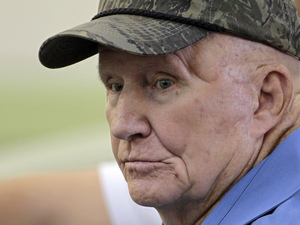Madeline
Rookie
- Banned
- #1
In my lifetime, terrible crimes were committed and never addressed. With the murder trial of former Alabama state trooper James Bonard Fowler for the murder of civil rights protestor Jimmie Lee Jackson in 1965 set to begin jury selection today, one less injustice remains unaddressed.
The accussed.....

Jury Selection Begins For Civil-Rights Cold Case : NPR
What are your thoughts on trials that take place decades after the crime occurred?
In the Deep South of 1965, segregation was the law of the land. Anyone who protested against the system was met with violence.
Not far from Selma, Ala., in Marion, a group of African Americans was gathering in a church at night. Alabama state troopers, including James Bonard Fowler, were called in to break up the meeting, and, using billy clubs, they began beating protesters, including 26-year-old Jimmie Lee Jackson.
Jackson fled to Mack's Cafe, and some witnesses said he was being beaten as he tried to protect his mother and grandfather.
But Fowler, now 77, said he acted in self-defense. He shot Jackson in the stomach but claims the protester was trying to take away his gun.
Eight days later, Jackson, a Vietnam War veteran, died at a local hospital, and the Rev. Martin Luther King Jr. traveled to Alabama to speak at the funeral.
"He was murdered by the timidity of a federal government that can spend millions of dollars a day to keep troops in South Vietnam and cannot protect the lives of its own citizens seeking the right to vote," King said.
More than 20 civil-rights-era cases have come to trial since 1994, including the successful prosecution of James Ford Seale in Mississippi for the murder of two black teens, and the convictions of Thomas Blanton and Bobby Cherry for the bombing of the 16th Street Baptist Church in Birmingham.
Doug Jones, the former U.S. attorney in Alabama who prosecuted the church bombing cases, says Jackson's death stands out among other civil-rights-era cases.
"This is not just a random Klansman who bombed the 16th Street Baptist Church," Jones says. "Here you got a state trooper, law enforcement officer, called out to keep order. That gives a dynamic to this case that's not present in the normal civil rights cold cases."
Jackson's death galvanized civil rights leaders. Just days later, activists marched from Selma to Montgomery, and the police brutality during that march, known as Bloody Sunday, ultimately led to the 1965 Voting Rights Act.
The accussed.....

Jury Selection Begins For Civil-Rights Cold Case : NPR
What are your thoughts on trials that take place decades after the crime occurred?